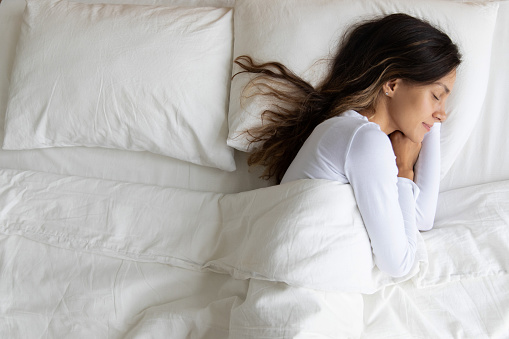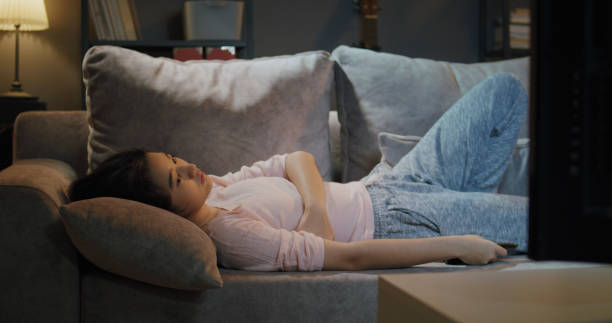How much time do you spend attempting to sleep? In less than five minutes, are you able to rapidly shut off all of your thoughts and relax? Or does it take you a long time to relax, so your mind won’t start going through tomorrow’s to-do list?
Don’t you wish you could sleep for less than five minutes quickly? It’s time to stop rolling about in bed in frustration or spending hours staring at the ceiling. Enjoy this article as we look at 13 suggestions for getting the sleep you need to feel joyful.
1. Wear blue light-blocking glasses to block out the light
Who unwinds from a long day by browsing through their phone, checking their laptop, watching the upcoming Netflix episode, or even reading a book in bed?
Most people, I assume? While watching some mindless TV and surfing through social media is fine, the problem is the light that comes from both these devices and our nightstand lamps.
The shortest-wavelength visible light with a high energy is known as blue light. Researchers have hypothesized that blue light’s high energy may increase our risk of macular degeneration, digital eye strain, and even impair melatonin release, our essential sleep hormone. (source)
Just give it some thought. You’re in bed looking through your phone when you eventually start to yawn and realize it’s time to go to bed. You anticipate to fall asleep in less than five minutes after turning out the light, right? Since your sleep hormone hasn’t had time to prepare, it’s unlikely to happen.
Even with this understanding of the risks associated with blue light before night, it’s doubtful that our behaviors will alter quickly. Putting on a pair of blue light-blocking glasses has proven to be a quick and easy option, and it has provided the resolution I was looking for.
For more information and some wonderful films describing what blue light blockers do in more depth, you can also read our page on shift work tools here.
Despite the fact that being exposed to blue light seems awful, it’s crucial for regulating our body clock, or circadian rhythm, during the day. Click here to read another piece we created where we discuss why not all blue light is harmful if you want to understand more about blue light.
2. Close your screen or turn it off
Even though we just discussed wearing a pair of stylish, reasonably priced glasses to block out blue light, we know some of you won’t do it. While watching television or when brushing your teeth, glasses are not something you want to be wearing. I got it.
Can you spend some time before bed reading, solving a puzzle, or stretching instead of using your phone, laptop, or even the TV? Even though the light will likely still have an impact on melatonin production, why not use a candle or a book light that is “blue light friendly” that you could attach to the back of a chair? I have one like this and use it every night. I found it on Amazon.
Though most current gadgets have a “night shift mode” that may aid in melatonin synthesis and be a bit gentler on your eyes, turning off your device or donning the blue light-blocking glasses I described earlier is definitely a better option.
3. Choose the proper temperature
Even though it could be uncomfortable at first, it’s best to give your body what it needs because it naturally declines overnight (reaching its coldest at 4 am). (I use a heat pack or hot water bottle to temporarily cure this awful cold)
If it’s too hot, consider opening a window, using a fan, or even purchasing a portable air conditioner from Amazon, which is reasonably priced.
It’s more challenging for your body to unwind and get ready for sleep when it’s too hot outside since you’re battling your natural circadian cycle. Additionally, if it’s too hot, you can fidget more, feel more restless, and have vivid dreams that wake you up in the middle of the night.
4. Consume tea to induce sleep
You can start unwinding your body and mind by incorporating sleep tea into your bedtime ritual.
In a typical day, I drink a wide range of teas. This nighttime tea typically contains herbs that are said to induce sleep and relaxation, such as chamomile, lavender, and vanilla, so I won’t need to use the restroom constantly during the night.
5. Maintain Breathing Control
I neglected this technique for getting to sleep for a very long time because I believed it would never work.
But ever since I started to genuinely pay attention and appreciate myself, I’ve noticed how amazing and worthwhile the consequences of calm, relaxed breathing are.
6. Reflection
While initially appearing unusual, sitting still and doing nothing is a fairly natural activity that has been practiced for millennia.
The 4-7-8 approach is an excellent way to begin incorporating meditation into your life gradually. It’s a little different from the ones stated above, so it takes some getting used to, but it works great!
Try this straightforward but effective approach if the events of your shift have left you feeling a touch wired. Your nervous system will be soothed, and it will help you feel peaceful and relaxed.
What you should do is:
- Put the tongue’s tip first behind your upper front teeth.
- While mentally counting to eight, open your mouth and let out a full breath.
- Continue this cycle for a minimum of three more times.
7. List the things that are causing you stress
Write it down if you’re laying in bed and can’t stop thinking about your day or what needs to get done tomorrow. Make it an issue for tomorrow.
The majority of the time, the problems are not critical and can be resolved or at least addressed the next day.
The anxiety of forgetting it is gone once it is on writing.
Simply avoid using the phone’s light for this, since the blue light will trigger the sleep hormones once more.
When giving sleeping advice, it’s common to hear, “Just stop thinking about it.” But I can’t seem to make that work. I find that putting my anxieties and concerns in writing helps me fall asleep quicker.
8. Employ aromatherapy and lavender
There’s more to lavender than just gorgeous flowers! It is a potent essential oil that has been proved to help with PTSD symptoms, brain function, stress reduction, and sleep aid.
Use lavender if you find yourself pacing the house restlessly, anxious, and wishing you were asleep now even though you’re not exhausted.






